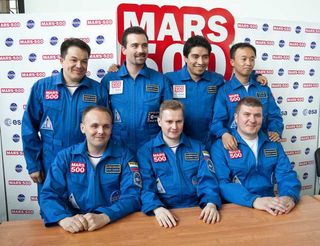Final Crew Unveiled for Record Mock Mars Mission

The full international team of mock astronauts that will belocked in a pretend spaceship complex for a record 520 days in a simulated missionto Mars is all set for their endurance trial, Russia's Federal Space Agencyannounced Wednesday.
The volunteer6-man crew, made up of three Russians, two Europeans and a Chinese astronautinstructor, will enter an 18,800 square-foot (1,750 square-meter), five-modulecomplex on June 3, and live like Mars-bound astronauts, as part of theelaborate Mars500simulated mission to the red planet.
Over 6,000 people from 40 countries applied to join the $15million endurance test of the psychological and physiological effects oflong-term confinement, said Mark Belakovsky, deputy head of the Mars500 project,according to news reports in Moscow.
One of the four Russians who also made the cut will serve asa replacement in the event that someone drops out.
Full mock Mars crew revealed
The Russian crew members include engineers Alexei Sitev andMikhail Sinelnikov, surgeon Sukhrob Kamolov and physiologist AlexanderSmoleevsky. They will be joined by Chinese astronaut trainer Wang Yue, Italianengineer Diego Urbina and French engineer Romain Charles. Each of thevolunteers will earn about $99,000 for their participation.
For a total of 17 months, the crewmates will seal themselvesinside the isolation module set up at Russia's Institute of Biomedical Problemsin Moscow. The mock spaceship also includes an interplanetary vehicle, a Marslander and base, as well as an area carefully sculpted to simulate theMartian landscape.
Get the Space.com Newsletter
Breaking space news, the latest updates on rocket launches, skywatching events and more!
Endurance "Mars" marathon
The crew's confinement in the mock Mars spaceship could helpscientists determine the human endurance breaking point when faced with livingin close quarters with strangers during a 520-day period of isolation, cut offfrom the outside world. Researchers in Europe and Russia will watch and recordthe crew's psychological and physiological signs throughout the experiment.
Communication is restricted solely to e-mail, and willundergo occasional disruption, as would occur in a real Mars mission due to solarstorms and other such issues. The crew must also deal with as much as 40minutes of delay when transmitting back to Earth during the Marsoperational phase of the simulation.
The first 250 days of the experiment will replicate theamount of time it would take to reach the Martian surface using currenttechnology. After reaching Mars, three crewmembers will spend 30 days"exploring and colonizing" the red planet before returning to thespacecraft for the 240-day return flight, Belakovsky said.
This 520-day mock mission is the final phase of thethree-part Mars500 project, which was partly funded by the European SpaceAgency. The experiment was first proposed more than a decade ago.
Previously, a six-man crew performed a 14-day simulation inNovember 2007 that tested facilities and operational procedures. The secondphase kicked off in March 2009, when six crewmembers spent 105 days in theartificial spaceship complex.
None of the previous crewmembers applied to participate in thefinal stage of the experiment, which starts next month.
- Images- Mars Base of the Future
- TheBest and Worst Mars Landings Ever
- Video- How European Astronauts May Go to Mars
Join our Space Forums to keep talking space on the latest missions, night sky and more! And if you have a news tip, correction or comment, let us know at: community@space.com.

Space.com is the premier source of space exploration, innovation and astronomy news, chronicling (and celebrating) humanity's ongoing expansion across the final frontier. Originally founded in 1999, Space.com is, and always has been, the passion of writers and editors who are space fans and also trained journalists. Our current news team consists of Editor-in-Chief Tariq Malik; Editor Hanneke Weitering, Senior Space Writer Mike Wall; Senior Writer Meghan Bartels; Senior Writer Chelsea Gohd, Senior Writer Tereza Pultarova and Staff Writer Alexander Cox, focusing on e-commerce. Senior Producer Steve Spaleta oversees our space videos, with Diana Whitcroft as our Social Media Editor.
